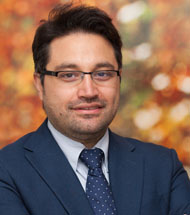20_04_30_EDU_changes
9 positive changes we will experience during de-escalation
The search for intimacy, face-to-face relationships, flexibility in our habits or greater care for the elderly, among the changes predicted by the psychologist of the University of Navarra.


During de-escalation we will crave greater intimacy, with the search for space and time for ourselves; we will become more flexible in our habits; and there will be a change in the way trust in interpersonal relationships is established and we will prefer face-to-face relationships. These are some of the changes that, according to the professor of the School of Education and Psychology of the University of Navarra, Elkin Luis, will arise as a consequence of the relief of isolation.
The psychologist details nine positive changes, among which he predicts an increase in the taste for outdoor activities, the pedagogy of the use of technologies, to discern between reliable information versus fake news, or the increase in the value of science and telemedicine.
The psychologist from the University of Navarra recalls the different psychological stages through which the Chinese population went through and which were published by business Ipsos last March: disbelief, preparation, adjustment, acclimatization, resistance, relief, and finally fear before the appearance of the new uncertainty marked by the economic aftermath that is gradually becoming evident.
According to the expert, change is the only constant in these stages, "which force society to use its capacity to adapt as a shock plan. These changes manifest themselves differently in each individual. "Some people may clearly show criteria associated with a disorder, but many others will show resistant responses, or with brief symptoms or consequences that fall outside the diagnostic criteria. The impact of these situations can be subtle, insidious or totally destructive," he adds.
In this sense, he points out that "the human capacity to simulate hypothetical scenarios financial aid helps us to face future situations. It is a social necessity," the psychologist stresses. For this reason, people expect to project what our reactions will be - thoughts, behaviors and emotions - to what we are going to be exposed to.
The expert points out these nine changes from the perspective of social psychology and emphasizes that "whether many of these points are fulfilled or not, all possible futures are dependent on how we respond as individuals and as a society to this crisis in the today and now".
9 de-escalation changes-
A special taste in practicing pleasurable outdoor activities. We will look for physical exercise and other outdoor activities, even for those people who have not enjoyed them until now. That said, "let's rethink what activities can or cannot be done at group, and how they are approached."
-
The search for intimacy will be the refractory response to living so many days together during isolation, and the subsequent need to be with others - friends or other family members - after isolation.
-
deadline In the short term, young people will be looking for'face-to-face' relationships or physical contact , after a period of constant relationship through video calls or social networks. On the other side of the coin, adults will have acquired this resource from the new technologies and will understand it as another one alongside face-to-face relationships.
-
Trust, which until now was established by the similarity of affinities between individuals, is going to add perceiving the self-care of the other as another element for the new relationships that are produced, or to 'confirm' those that already existed."
-
More awareness of the world around us and a positive vision of the whole. In this crisis, we have been reminded of the essential role that each individual brings to the whole group, for example the role of the farmer or the cleaning lady.
-
Pedagogy of the use of technologies. Discerning between reliable information versus fake news will be a point core topic that society will demand. The media and other entities, such as universities and institutes, will not only have to teach contents, but also ways of searching and criteria to establish their veracity.
-
Flexibility in our habits. Habits facilitate the illusion that we control our lives but "now we will have more control because we know that habits can be changed as the virus develops" and this translates into flexibility. Flexibility that we have achieved by adapting certain habits - forcibly - during isolation.
-
The value of science and 'telepsychology and telemedicine' will increase , and we will see a greater demand in universities for healthcare careers such as medicine, nursing, pharmacy, biomedical engineering and psychology.
-
Until now, Spanish society was more focused on "taking care of the child". With this crisis, we have given it a twist and we have seen the need to rethink how we take care of ourselves and how we take care of our grandparents.

